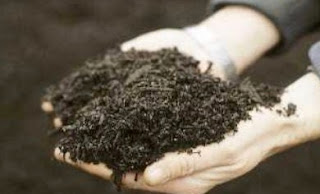
El Dorado County master gardeners offer hands-on workshop

|
|
Here's the end result of composting:
"garden gold" to enrich the soil. (Photo
courtesy UCCE)
|
Time to make some garden gold!
Learn how to compost during a free class Saturday, Aug. 20, offered by the UCCE Master Gardeners of El Dorado County.
From 9 a.m. to noon Saturday at Sherwood Demonstration Garden in Placerville, this hands-on workshop will tackle all the basics: What to put into the compost, which methods to use and how to speed up the process.
Why compost?
“Compost provides valuable nutrients for your garden soil,” say the master gardeners. “Compost helps retain moisture which saves water, suppresses weeds, prevents soil erosion, and loosens compacted soils for better drainage and water retention.”
Under new California law, consumers are encouraged to separate food waste from other trash. Food waste rotting in landfills is a major cause of methane, a major greenhouse gas. Communities will be required to turn collected food waste into compost or burn it as biofuel.
Why not cut out the middleman and make your own compost at home?
“It is rewarding to know you are turning waste into a nutrient-rich organic material for your garden,” add the master gardeners.
Sherwood Demonstration Garden is located at 6699 Campus Drive, Placerville, on the El Dorado Center campus of Folsom Lake College.
This workshop comes with a bonus: Sherwood Garden is also open for tours Saturday morning.
“Our demonstration garden will be open for viewing and tours as well as volunteer Master Gardeners on site to answer your home gardening questions,” say the hosts.
For details and directions: https://mgeldorado.ucanr.edu/ .
Comments
0 comments have been posted.Sacramento Digs Gardening to your inbox.
Food in My Back Yard Series
April 1: Don't be fooled by these garden myths
March 25: Fertilizer tips: How to 'feed' your vegetables for healthy growth
March 18: Time to give vegetable seedlings some more space
March 11: Ways to win the fight against weeds
March 4: Potatoes from the garden
Feb. 25: Plant a fruit tree now -- for later
Feb. 18: How to squeeze more food into less space
Feb. 11: When to plant? Consider staggering your transplants
Feb. 4: Starting in seed starting
Sites We Like
Garden Checklist for week of March 30
Your garden doesn’t mind April showers. Get busy now to enjoy those future flowers.
* Get ready to swing into action in the vegetable garden. As nights warm up over 50 degrees, start setting out tomato, pepper and eggplant transplants.
* From seed, plant beans, beets, cantaloupes, carrots, corn, cucumbers, melons, pumpkins, radishes and squash. (Soak beet seeds overnight in water for better germination,)
* Plant onion sets.
* In the flower garden, plant seeds for asters, cosmos, celosia, marigolds, salvia, sunflowers and zinnias.
* Transplant petunias, zinnias, geraniums and other summer bloomers.
* Plant perennials and dahlia tubers for summer bloom.
* Transplant lettuce and cabbage seedlings.
* April is the last chance to plant citrus trees such as dwarf orange, lemon and kumquat. These trees also look good in landscaping and provide fresh fruit in winter.
* Smell orange blossoms? Feed citrus trees with a low dose of balanced fertilizer (such as 10-10-10) during bloom to help set fruit. Keep an eye out for ants.
* Apply slow-release fertilizer to the lawn.